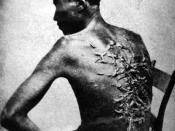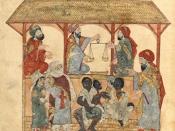The institution of slavery in the seventeenth-century had evolved into a whole new attitude by the nineteenth-century. A time where one's economic standing marked their place in society had long since been forgotten as the nineteenth-century began to give a new meaning to slave ideology. Racism became more of a determining factor in a slaves life as the nineteenth-century progressed and slaves were treated more unfairly in all aspects of life. As far as legal standings go, slaves during the 1700's were given consideration in the court of law, as opposed to the 1800's where a slave did not have a prayer in the often biased courtroom. It was a reachable goal for slaves in the seventeenth-century to become free, but this dream was blurred by the nineteenth-century's position on the matter. Gender also comes into context in the discussion of the sexual abuse towards female slaves in the nineteenth century and the lack of action against these perverse ways.
Excellent examples of slave conditions during these two periods in time can be drawn from the two novels, Myne Owne Ground and Celia, a Slave.
"As the following examination of free blacks in seventeenth-century Northampton County, Virginia, suggests, Englishmen and Africans could interact with one another on terms of relative equality for two generations." (Breen and Innes, 5). During the seventeenth-century, one's place in society was based on their economic standing, usually meaning how much land one was in possession of. Slavery was clearly existent in every day life, however it was far less intense then slavery of the nineteenth-century. In Myne Owne Ground, the peaceful coexistence of blacks and whites is described in great detail. Slaves of the seventeenth-century were not treated half as harshly as those of the nineteenth-century. In fact, they were treated quite well and...



Slavery: 17th Century vs. 19th Century
This has certainly opened my eyes (and mind) on my view of slavery! Very well written and cited. Everyone should read this essay! :)
10 out of 10 people found this comment useful.